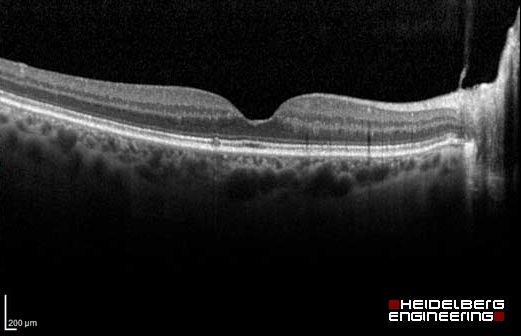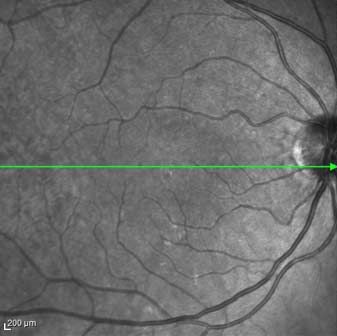The SPECTRALIS 4D HD OCT ADVANCED eye examination uses a patented eye-tracking system that allows Dr. Janjua to easily identify those at risk of eye disease. The tracking system allows the 3D scan to be placed in the same place (to one micron, which is 1/100th of a hair) at each visit, giving a true 4D view of change over time. This helps to reveal eye disease that may not yet be noticeable by the patient or detectable with a basic eye exam.
Fast, painless, and non-contact, the scan takes place in seconds and does not include any bright flashes of light or puffs of air. Common eye diseases can impair vision and cause permanent vision loss if not caught at an early stage. The best preventative measure to protect good vision is an annual advanced eye examination and treatment when needed.
This retinal scan differs entirely from the routine eye photos of many opticians or your diabetic clinics. The OCT instrument scans below the eye’s surface using safe, low-powered lasers. It is completely painless and non-invasive and takes only a matter of seconds. Your results are available instantaneously, and it is an excellent way for you and your optometrist to better understand the health of your eyes or any eye conditions.
By using the Spectralis 4D OCT (Optical Coherence Tomographer) Retinal Scan, Dr Janjua can diagnose many more eye problems at the earliest possible stage (sometimes up to 8 years earlier than standard tests). We can treat eye conditions sooner and prevent many from developing, which is our job's main aim: maintaining sight.
What does it do?
The Retina is the inner lining at the back of your eye. It acts similarly to the film in a camera, capturing the image of what you see and then transferring this image to the brain for interpretation. When an Optometrist looks into your eye or takes a photograph, it is the retina they are looking at.
Conventional digital cameras, used by many opticians, look at the top surface of the retina, but many eye problems start at a deeper level. The Spectralis 4D OCT Eye Scanner is the equivalent of a CAT scan of your eye. Unlike retinal photographs, this new system allows us to take a very high-resolution detailed image of your retina allowing a look below the surface at each layer of the retina to create a High-Definition map that provides us with information never before available. The new Spectralis 4D OCT can help us diagnose and monitor conditions with the accuracy of one-thousandth of a millimetre. Diagnosing conditions many years sooner than a standard eye examination. Earlier detection leads to earlier treatment, a better prognosis, and, in some cases, the prevention of conditions from developing at all.


